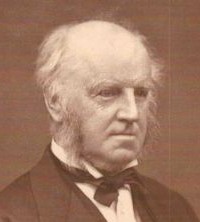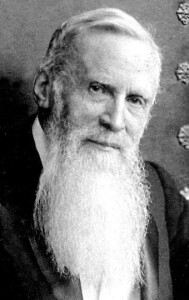
Heute vor 200 Jahren wurde der Evangelist Friedrich Wilhelm Baedeker im westfälischen Witten an der Ruhr geboren. Mit Witten wird sein Name freilich heute kaum noch assoziiert, sondern vielmehr mit England (wo er ab 1859 seinen Hauptwohnsitz hatte und zum Glauben kam) und vor allem mit Russland (wo er ab 1876 unermüdlich evangelisierte). Die erste Biografie, die bereits im Jahr nach seinem Tod erschien, trug daher auch den Titel Dr. Baedeker and his Apostolic Work in Russia,1 und die jüngste Buchveröffentlichung über ihn, herausgegeben zum 100. Todestag 2006, stellt im Untertitel ebenfalls den Russlandmissionar heraus.2
Lebensbeschreibungen Baedekers liegen auch online in ausreichend großer Zahl vor. Ich nenne in chronologischer Reihenfolge:
- Robert Sloan Latimer: Dr. Baedeker: and his Apostolic Work in Russia (1907)
- Robert Sloan Latimer: Baedekers Leben (= Ein Bote des Königs. Dr. F. W. Baedekers Leben und Wirken, 1907)
- D[ouglas] R[ussell]: Dr. F. W. Baedeker (Chief Men among the Brethren, 1918, ²1931)
- Daniel Herm: Friedrich Wilhelm Baedeker (Die Botschaft, 1972; nachgedruckt in Zeit & Schrift, 2006)
- Friedrich Wilhelm Bautz: Baedeker, Friedrich Wilhelm (Biographisch-Bibliographisches Kirchenlexikon, 1990)
- John Bjorlie: Baedeker in Russia (Uplook, 1991)
- Stephan Holthaus: Weitblick des Glaubens. Friedrich Wilhelm Baedeker – der Evangelist Russlands (Perspektive, 2006; auch auf bruederbewegung.de)
- ChoG u.a.: Friedrich Wilhelm Baedeker (Wikipedia, ab 2012)
- Bert Cargill: Frederick W. Baedeker 1823–1906 (Precious Seed, 2023)
Auf einen eigenen biografischen Aufguss kann ich hier daher wohl verzichten; nützlicher erscheint mir die Veröffentlichung einiger bisher unbekannter Zeitungstexte, die ich vor einigen Jahren bei meinen Recherchen im British Newspaper Archive gefunden habe.
Baedeker in englischen Zeitungen
1887 sprach Baedeker gemeinsam mit Julius Rohrbach (1852–1935)3 in seiner Heimatgemeinde Weston-super-Mare über die Evangelisationsarbeit in Deutschland:
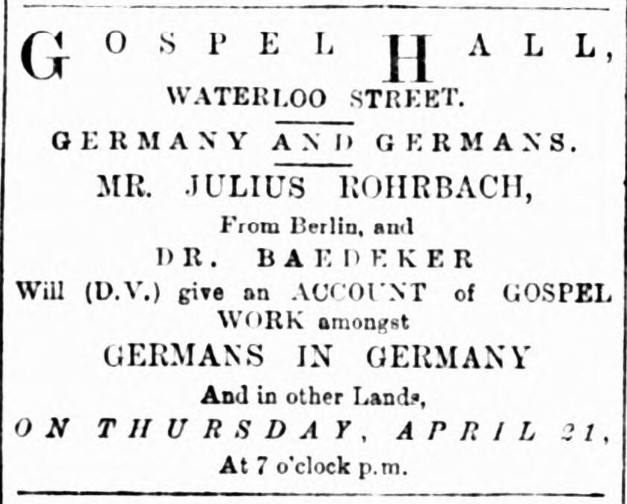
1898 berichtete das North Devon Journal ausführlich über einen Vortrag Baedekers in Barnstaple und verschaffte den Lesern damit einen recht guten Einblick in seine Arbeit (wegen der Länge gebe ich den Artikel in Transkription wieder):
DR. BAEDEKER AT BARNSTAPLE.
In connection with the Plymouth Brethren cause, Dr. T. [sic] W. Baedeker (a well-known Christian traveller) preached most acceptably at the Grosvenor-street Chapel, Barnstaple, on Sunday. His address in the afternoon on work in the Russian prisons and among the persecuted Stundists in Siberia was anticipated with special interest, and there was a large congregation present. At the outset Dr. Baedeker (who is about sixty five years of age4) pointed out that Russia was one-sixth part of the inhabitable world, and that it contained 146 millions of people, who spoke 128 different languages. It was a large mission field, and nearly all nations were represented among the inhabitants. There were many there who had never heard the Word of God, and there were many millions who read the Word of God and had no intelligence for it. They were bound by an outward form of religion and ceremonies, with no power to keep them from sin at all. That was just the field into which God, in His great lovingkindness, had led him during the past twenty-one years. During the first ten years he visited various parts of Russia, preaching the Gospel, as well as he was able, wherever he found willing ears. About eleven years ago he went to Finland, where there was more religious liberty than in any other part of Russia, and visited all the prisons there. He afterwards obtained permission to visit all the prisons in the Russian Empire, and to give each prisoner a Testament in his own language. The British and Foreign Bible Society issued Testaments in 180 different languages, and they sold him the books at one-quarter the price for the prisoners. In visiting Moscow he lost his pocket-book and money, but there was light in the darkness, for he obtained fresh permission to visit the prisons, whilst friends helped him financially from St. Petersburg. Since then he had visited Siberia altogether four times, and he instanced an act of noble generosity on the part of a steamboat director in allowing him to travel free of cost. He wanted people in England to have a share in this work of God. There were open doors for the Gospel among the Stundists, and with Bible reading in various languages, the Word was the power of God unto salvation. As there were thousands of wolves and bears in the country, and travelling was otherwise dangerous, he had been advised to carry a revolver for protection; but he had never done this, and had never seen a wolf or been injured in any way. It was a great joy and privilege to be allowed to speak to the prisoners. In St. Petersburg there were 1,100 prisoners, each one in his own cage; and as he spoke to each separately, it took him five days to go through the gaol. All through the way had been very marvellously and wisely opened up, and he did not know that he had done with Russia yet. The prison doors were all open, and whilst he was away friends behind were still carrying on the work. Siberia, a country only just beginning to be peopled, was very rich, and full of treasures yet to be found. The crime of the Stundists, who were simple people, consisted in not conforming to the Greek Church, which, as he had said before, was full of ceremonies without any Gospel, although it allowed the New Testament to be freely distributed. But religion, apart from the Lord, was a dead thing. There was no religion, no church, except the Lord’s. He showed that the Stundists were subjected to much persecution through faith in the New Testament. In Roumania there were two colonies of Stundists who had escaped from punishment, and they were working for the Lord, their testimony being a great power in the land. He appealed to his hearers to pray for them, and to stand by them in prayer. – The address was interspersed with many incidents and anecdotes, not the least interesting being those which showed how his prayers in his difficult work had been answered, and the wonderful dream which resulted in his being enabled to visit prisoners who had been banished on an island for life.5
Gut acht Jahre später war Baedekers Arbeit leider zu Ende. Nachdem er sich auf einer Konferenz in Clifton eine Erkältung zugezogen hatte, die zu einer Lungenentzündung führte, starb er am 9. Oktober 1906 in seinem Haus in Weston-super-Mare, 83 Jahre alt.6 Der Zeitungsbericht über die Konferenz in der Western Daily Press lässt noch nichts davon ahnen:
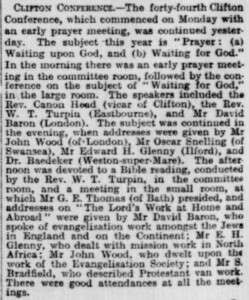
Acht Tage danach musste die Zeitung jedoch Baedekers Tod melden (das angegebene Geburtsjahr ist natürlich falsch):
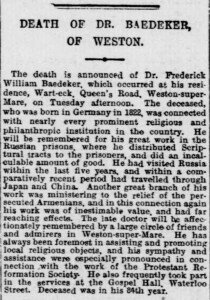
Der Manchester Courier fasste die Nachricht etwas kürzer:
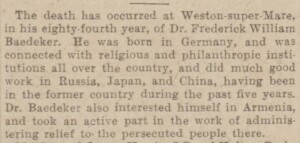
Die Bath Chronicle schließlich brachte folgenden freundlichen Nachruf:
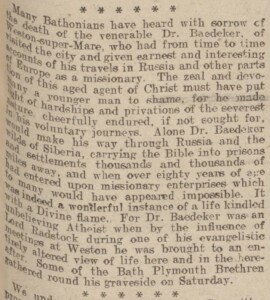
Einen Monat später wusste die Western Daily Press sogar noch den Wert von Baedekers Nachlass zu berichten:

Nach heutiger Kaufkraft entspräche dies immerhin £ 194.800 oder mehr.7
Baedeker in Deutschland
Aus deutscher Sicht interessant (und wenig bekannt) sind noch die zahlreichen Berichte in der Missionszeitschrift Echoes of Service über Baedekers Deutschlandreisen. Auf dem Weg von England nach Russland und zurück war Deutschland eine nahezu unvermeidliche Zwischenstation, aber Baedeker besuchte wiederholt auch Städte, die abseits der üblichen Route lagen, oder unternahm regelrechte Rundreisen. Im Einzelnen werden erwähnt:8
- 1877: Berlin
- 1878: Karlsruhe
- 1880: Hückeswagen, Wermelskirchen
- 1881: Berlin, Lübeck, Hamburg, Schleswig, Düsseldorf, Dresden
- 1883–1886: fünfmal Berlin
- 1888: Karlsruhe, Wiesbaden, Berlin, Hattingen, Witten, Blankenburg, [Bad] Homburg9
- 1889: Berlin
- 1890: Düsseldorf, Wiesbaden, Berlin
- 1891: Berlin, Frankfurt, [Bad] Homburg
- 1893: Süddeutschland
- 1894: Berlin, Frankfurt und andere Städte
- 1895: Berlin, Frankfurt, [Bad] Homburg, Darmstadt, Heidelberg, Stuttgart
- 1896: Berlin, Leipzig, Blankenburg, Frankfurt, Heidelberg, Stuttgart, Düsseldorf, Neukirchen
- 1897: Blankenburg, Gotha, Frankfurt, Heidelberg, Berlin
- 1898: Berlin, Blankenburg, Dortmund, Düsseldorf
- 1900: Berlin, Blankenburg, Baden, Wiesbaden, Frankfurt
- 1901: Hamburg, Berlin, Görlitz
- 1903: Süddeutschland, Blankenburg
- 1905: Süddeutschland
Alle diese Berichte können in der Anthologie Early Open Brethren in the German-Speaking Countries nachgelesen werden, die ich 2018 für bruederbewegung.de zusammengestellt habe.
